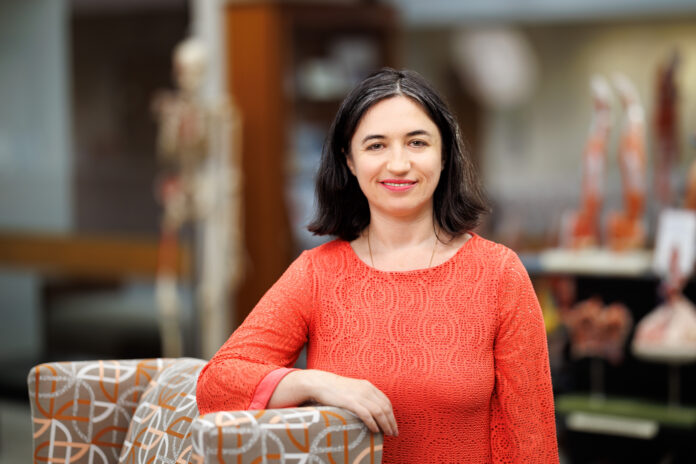MACON — Mercer University School of Medicine Associate Professor Ilana Chefetz Menaker, Ph.D., received funding from the Kaleidoscope of Hope Ovarian Cancer Foundation to study early biomarkers of ovarian cancer to improve detection and prevention of the deadly disease. The one-year $50,000 funding will support Dr. Chefetz and her team as they work to identify the process of ovarian cancer growth.
“Dr. Chefetz is an outstanding researcher and is focused on improving women’s health,” said Jean Sumner, M.D., FACP, dean of the School of Medicine. “Her work has tremendous potential to save lives if ovarian cancer can be detected early in its course.”
Dr. Chefetz has studied ovarian cancer as a basic and translational researcher for over 14 years. Her research focuses on cancer stem cells, chemoresistance, cell death and novel therapeutics. She studies lysosomes, membrane-bound cell organelles that contain digestive enzymes and are involved with various cell processes. In the exploratory phase of this work, Dr. Chefetz’s goal is to translate her findings into the development of lysosome-based biomarkers for early detection and potential prevention of ovarian cancer.
Early diagnosis of ovarian cancer is still an unmet medical need, as no diagnostic test is available for general population screening.
“Ovarian cancer is usually very curable, but it’s caught too late and is one of the deadliest forms of cancer,” said Dr. Chefetz. “Our goal is to help find a way to diagnose ovarian cancer earlier and determine where in the process of cancer growth we can intervene with preventative measures.”
Dr. Chefetz will work with co-investigators Kristina Hawkins, M.D., assistant program director in the obstetrics and gynecologist residency program at Atrium Health Navicent, and Kenneth I. Onyedibe, M.B.B.S., Ph.D., associate professor at the School of Medicine. The grant will also create research opportunities for residents and medical, graduate and undergraduate students.
“Dr. Chefetz has been a wonderful addition to our research faculty, and we congratulate her and her co-investigators on obtaining the award,” said Bob Visalli, Ph.D., associate dean for biomedical research at the School of Medicine. “The collaborative effort is a model we encourage faculty to explore and will provide our faculty and students with additional research opportunities.”
“This is a very new project, and getting support for a new project is exciting,” Dr. Chefetz said. “I look forward to using this opportunity to expand this project and continue to apply for additional funding.”
Kaleidoscope of Hope Ovarian Cancer Foundation is a private foundation based in New Jersey that has granted over $3.25 million to ovarian cancer researchers since 2000. Its mission is to raise funds for ovarian cancer research and increase awareness of the disease’s symptoms.
About Mercer University School of Medicine (Macon, Savannah, Columbus and Valdosta)
Mercer University’s School of Medicine was established in 1982 to educate physicians and health professionals to meet the primary care and health care needs of rural and medically underserved areas of Georgia. Today, more than 60 percent of graduates currently practice in the state of Georgia, and of those, more than 80 percent are practicing in rural or medically underserved areas of Georgia. Mercer medical students benefit from a problem-based medical education program that provides early patient care experiences. Such an academic environment fosters the early development of clinical problem-solving and instills in each student an awareness of the place of the basic medical sciences in medical practice. The School opened additional four-year M.D. campuses in Savannah in 2008 and in Columbus in 2021, and a clinical campus in Valdosta in 2024. Following their second year, students participate in core clinical clerkships at the School’s primary teaching hospitals: Atrium Health Navicent The Medical Center and Piedmont Macon Medical Center in Macon; Memorial Health University Medical Center in Savannah; Piedmont Columbus Regional Hospital and St. Francis Hospital in Columbus; and SGMC Health in Valdosta. The School also offers master’s degrees in preclinical sciences and family therapy and Ph.D.s in biomedical sciences and rural health sciences.










